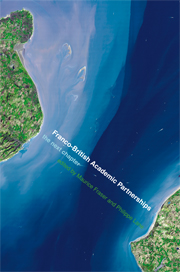Book contents
- Frontmatter
- Contents
- Notes on Contributors
- Foreword by His Excellency Bernard Emié
- Foreword by Sir Peter Westmacott
- Preface
- Part I Teaching and Training Partnerships
- Part II Research Partnerships
- 12 Franco-British Academic Partnership: Perspective from Imperial College London
- 13 Sorbonne University's Franco-British Partnerships
- 14 The École Pratique des Hautes Études (EPHE), Paris: Research Collaboration Between Britain and France
- 15 International University Partnerships and the Role of the French Connection: The Experience of a London College
- 16 Maison Française d'Oxford: A Hub of Academic Cooperation for the Humanities and Social Sciences in Oxford
- 17 Multicultural London English/Multicultural Paris French
- 18 Franco-British Cooperation in the Social Sciences During a Period of Structural Reform: Current Positions and Prospects
- 19 The Publishing Industry and Research Perspectives
- Part III Broader Perspectives
- Appendices: Addresses and Speeches at the Franco-British Academic Partnerships Seminar, French Institute, London, 5 February 2010
- Index
18 - Franco-British Cooperation in the Social Sciences During a Period of Structural Reform: Current Positions and Prospects
from Part II - Research Partnerships
- Frontmatter
- Contents
- Notes on Contributors
- Foreword by His Excellency Bernard Emié
- Foreword by Sir Peter Westmacott
- Preface
- Part I Teaching and Training Partnerships
- Part II Research Partnerships
- 12 Franco-British Academic Partnership: Perspective from Imperial College London
- 13 Sorbonne University's Franco-British Partnerships
- 14 The École Pratique des Hautes Études (EPHE), Paris: Research Collaboration Between Britain and France
- 15 International University Partnerships and the Role of the French Connection: The Experience of a London College
- 16 Maison Française d'Oxford: A Hub of Academic Cooperation for the Humanities and Social Sciences in Oxford
- 17 Multicultural London English/Multicultural Paris French
- 18 Franco-British Cooperation in the Social Sciences During a Period of Structural Reform: Current Positions and Prospects
- 19 The Publishing Industry and Research Perspectives
- Part III Broader Perspectives
- Appendices: Addresses and Speeches at the Franco-British Academic Partnerships Seminar, French Institute, London, 5 February 2010
- Index
Summary
In this chapter, I will review some of the potential barriers to scientific cooperation between Britain and France, drawing on my own experience as a British social psychologist who has worked in both countries, as well as in America and Germany. It is the ‘bottom-up’ view of a researcher currently working in the French university system, but who has also worked in business schools in the Grande École system in France. My focus will be on potential opportunities for and barriers to cooperation between British and French universities due to differences in organisation of education and research in the two countries. In my view, it will help the success of these partnerships if there is an understanding of the different institutional contexts on both sides. I will touch on the current reforms of the French system and their potential implications for Franco-British collaborations. I hope that these remarks will be helpful in depicting the institutional and cultural landscapes in which such European collaborations take place.
Before going further, it is important to distinguish between institutional and cultural differences. While the institutional differences are national – for example the Humboldtian view of a university in the UK, where research and teaching are integrated in a single institution, versus the bicephalous organisation of ‘research’ (CNRS, INSERM etc.) and ‘teaching’ (Grandes Écoles, universities) institutions in France – the ‘cultural’ differences are subtle and differ from discipline to discipline.
- Type
- Chapter
- Information
- Franco-British Academic PartnershipsThe Next Chapter, pp. 145 - 151Publisher: Liverpool University PressPrint publication year: 2011



